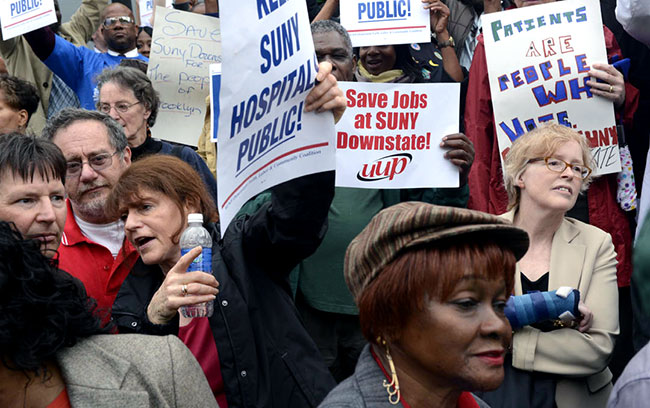The streets of Central Brooklyn filled with more than 1,000 impassioned supporters of SUNY Downstate Medical Center Thursday in a community-organized day of events on behalf of what residents in this part of Brooklyn call the community's hospital.
Hospital patients, employees, Brooklyn clergy, activists, unionists and lawmakers gathered on the front steps of the hospital for a kick-off news conference by the Rev. Al Sharpton, who told the crowd that he wanted to send this message to Albany: "Our demand is do whatever you have to do to save this institution. Not only are we talking about 8,000 professionals, we are talking about the services this hospital renders this community. The government must do whatever is necessary to save this hospital."
Several hundred people then marched three blocks to the Mt. Zion Church of God for an interfaith service that drew clergy from Christian, Muslim and Jewish congregations in the neighborhoods surrounding the hospital. Supporters of the hospital sang, chanted, applauded as speakers urged the state to save the hospital. The churchgoers returned to the hospital steps for a rally, and the crowd grew as the marchers made their way back to the Downstate entrance. There, they were joined by several hundred other supporters.
Hundreds of UUP members who work at the hospital turned out, as did several NYSUT leaders, including Executive Vice President Andy Pallotta; UUP President-elect Fred Kowal; UUP Secretary Eileen Landy; UUP Vice President for Professionals Philippe Abraham and Professional Staff Congress President Barbara Bowen.
UUP's Downstate Chapter President Rowena Blackman-Stroud said she was moved by the turnout and the community support.
"Our members have shown great courage in fighting for their patients, and the community has shown great courage in standing up for this hospital," Blackman-Stroud said. "This is part of what we believe will be a sustained campaign by the community around the hospital to make Albany listen and act. We demand no less, and our members stand in solidarity with the people of Central Brooklyn in this just fight."

The hospital is the fourth-largest employer in Brooklyn and has faced the threat of closure or privatization for more than two years now, but the State University of New York has never disclosed what it plans for the hospital. The hospital has a $100 million budget shortfall. Community outrage at the possibility of the hospital's closure or privatization has steadily grown. NYSUT and its largest higher education local, United University Professions, which represents several thousand of the Downstate employees, have worked closely with a coalition of Brooklyn clergy and community organizations to heighten attention to the hospital's plight. Employees say they are worried about the devastating effect on the community if the hospital cuts back services or closes, since it is a primary source of both in-patient and outpatient care for thousands of resident.
One of those residents who says the hospital saved his life came to the news conference Thursday to say "Thanks" to Downstate and to show his support. John Brown, 48, had a kidney transplant March 2012 at Downstate after trying to get several other hospitals in New York City to take him on as a Medicaid patient. Now, he says, "I feel excellent; I got my whole life back." He is enjoying a full life with his two sons, ages 7 and 8.
"I support these people," Brown said, nodding toward the hospital employees gathered on the steps. "If it wasn't for this hospital, I wouldn't have gotten the transplant. Downstate was the only place that would take me."